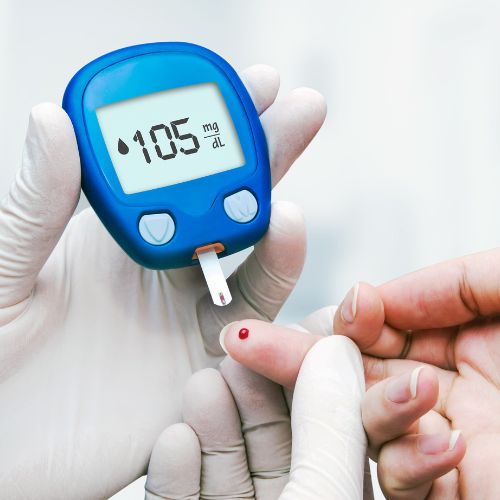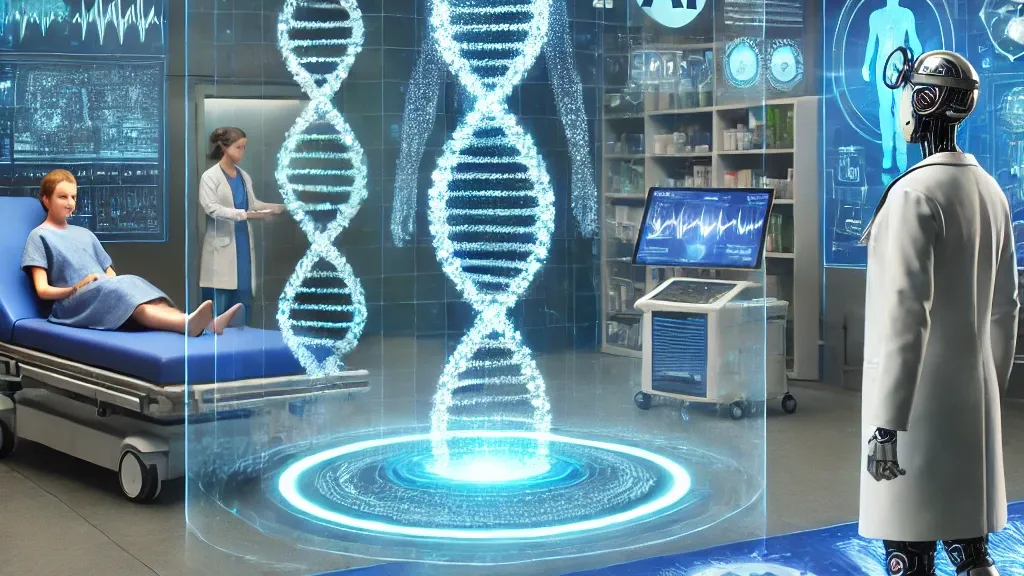Hey there, fellow student—grab a coffee and settle in because we’re about to chat about something that’s straight-up changing the game in medicine. Picture this: You’ve got a friend who’s battling a tough illness, and instead of throwing the same old pills at them that work for most people but flop for others, doctors zoom in on their unique DNA to craft a treatment that’s basically made just for them. Sounds like sci-fi, right? But it’s happening now, thanks to genomics in personalized medicine.
As someone knee-deep in studies, whether you’re eyeing biology, health sciences, or even just curious about your own future check-ups, this stuff matters. It could mean spotting risks before they hit or dodging side effects that mess up your vibe. So, have you ever wondered why one person’s miracle drug is another’s nightmare? Let’s break it down together, like we’re swapping notes over late-night study sessions.
What Exactly is Genomics in Personalized Medicine?
Okay, first things first—let’s unpack the basics without getting lost in jargon. Genomics is basically the study of all the genes in your body, that massive blueprint of about 3 billion DNA letters that makes you, well, you. It’s not just one gene; it’s the whole orchestra playing together. Personalized medicine? That’s the cool part where we use that genomic info to tweak healthcare to fit each person like a custom playlist.
Think about it this way: Traditional medicine is like handing out the same size shoes to everyone—some fit great, others pinch like crazy. Genomics flips that script by looking at your genetic quirks to predict what’ll work best. For instance, it helps docs figure out why you might metabolize caffeine like a champ while your roommate crashes after one sip. In healthcare, this means scanning your genes to spot disease patterns early or pick drugs that won’t backfire.
But why should you care as a student? Because this isn’t some distant lab experiment—it’s seeping into everyday clinics, and soon, it could be part of your routine bloodwork. Ever had a family history of something scary, like heart issues? Genomics could flag that and nudge you toward smarter choices now. It’s empowering, right? Let’s keep rolling into how this is actually shaking things up.
The Game-Changing Impact of Genomics in Personalized Medicine
Alright, now we’re getting to the heart of it—the genomics in personalized medicine impact that’s turning heads in hospitals worldwide. This isn’t hype; it’s backed by real shifts where patients are seeing way better results because treatments match their biology. One meta-analysis even showed an 85% jump in positive outcomes, from longer survival times to fewer complications. That’s huge—imagine cutting diabetes mishaps by 35% or slashing heart events by 30% just by tuning into your genes.

Speeding Up Diagnosis for Those Mystery Illnesses
Remember those frustrating “undiagnosed” cases that drag on for years? Genomics is like a detective with a superpower. Whole genome sequencing—basically reading your entire DNA code—can pinpoint rare diseases in days, not decades. Take kids with weird symptoms; programs like Utah’s NeoSeq sequence their DNA super fast, leading to spot-on diagnoses and custom plans that get them playing again. It’s slashed diagnostic “odysseys” by 60% for rare conditions. Have you thought about how this could rewrite stories for families dealing with unknowns?
Predicting Risks Before They Strike
Here’s where it gets proactive—and kinda mind-blowing. Genomics lets us forecast health hiccups years out, using things like polygenic risk scores. These tally up tiny genetic tweaks to estimate your odds for stuff like diabetes or heart disease. For example, if your genes scream “high cholesterol alert,” docs can push early tweaks like diet swaps or meds, dodging a full-blown crisis. In one study, this approach lit up hidden risks for breast or colon cancer, letting people act fast. It’s not fate; it’s a heads-up that puts you in the driver’s seat.
Tailoring Treatments That Actually Stick
And the treatments? Oh man, they’re evolving fast. Instead of trial-and-error, genomics guides “targeted therapies” that zero in on specific gene glitches. In cancer, for instance, spotting a BRAF mutation means prescribing vemurafenib, which zaps melanoma cells while sparing the good guys, boosting survival rates big time. Across trials, response rates hit 30% for precision picks versus a measly 5% for generics. It’s like upgrading from a scattershot to a sniper rifle in the fight against illness.
This impact ripples out, too—think public health, where genomics tracks outbreaks or tweaks vaccines for better fits. As a student, doesn’t it fire you up to see science making healthcare feel less like a gamble and more like a sure bet?
Real-Life Examples That Will Blow Your Mind
Theory’s cool, but stories stick. Let’s hit you with some jaw-dropping cases where genomics in personalized medicine has delivered knockout punches. These aren’t outliers; they’re the new normal creeping into clinics.
Conquering Cancer with Laser-Focused Drugs
Cancer’s a beast, but genomics is arming us better. In the NCI-MATCH trial, docs scanned tumors from thousands of tough-to-treat patients and matched them to gene-specific meds. Boom—response rates soared to 25.9% in key studies, with some breast cancer folks hitting 65% complete responses. One powerhouse: CAR-T therapy for blood cancers, where it nailed 76% responses in folks who’d run out of options, with 83% going into full remission. Ever imagine a treatment so pinpoint it rewires your immune system to hunt cancer like a pro?

Unraveling Rare Diseases for Kids
For the little ones hit with baffling symptoms, genomics is a lifeline. A 4-year-old girl with seizures? Sequencing revealed a Glut1 deficiency, swapping her meds for a low-carb diet that stopped the episodes cold. Or that 10-year-old fighting endless infections—turns out, a CTPS1 gene mutation, leading to a bone marrow transplant plan that saved her future. These aren’t just wins; they’re families getting their lives back.
Smart Dosing for Everyday Meds
Even routine stuff gets a genomics glow-up. Pharmacogenetics tests your genes to predict drug reactions—like avoiding abacavir in HIV if you’re at risk for killer allergies, switching to safer picks effortlessly. For chemo, DPYD testing flags folks who can’t handle fluoropyrimidines, preventing brutal side effects. In diabetes, gene-tailored plans hit blood sugar targets 80% of the time versus 65% standard. It’s simple: Fewer oops moments, more “aha” successes.

These tales show the human side—genomics isn’t cold code; it’s hope in action. What example hits closest to home for you?
The Bright Side: Five Massive Benefits You Can’t Ignore
Let’s pump the brakes on the heavy and spotlight the upsides. The genomics in personalized medicine impact boils down to some seriously powerful perks that make you go, “Whoa, sign me up.” Here are five that stand out, no fluff.
- Skyrocketing Success Rates: We’re talking 85% better outcomes overall—longer lives, fewer hospital bounces. In oncology, matched therapies stretch progression-free time to 5.7 months from under 3.
- Early Warnings That Save Lives: Polygenic scores flag risks for heart disease or diabetes, letting you tweak habits young and dodge disasters. It’s preventive power at its finest.
- Fewer Side Effect Surprises: Gene tests cut adverse reactions, like in HIV meds, keeping treatments tolerable and sticking.
- Faster, Smarter Drug Discovery: Genetic scans uncover new targets, speeding trials and birthing breakthroughs like BMN111 for growth disorders. Lindus Health notes this revolutionizes R&D, slashing waste.
- Empowering You in Your Health Story: It’s not just docs calling shots; you get data to make informed moves, from diet to exercise.
These aren’t pie-in-the-sky; they’re stacking up in real clinics. Doesn’t it make you optimistic about where medicine’s headed?
The Tough Stuff: Challenges We Can’t Brush Off
Look, no revolution’s perfect, and genomics in personalized medicine has its thorns. We gotta talk about them honestly because ignoring the bumps won’t smooth the road. As students, you’re the next gen tackling these—ready to brainstorm fixes?
The Wallet Woe: Costs That Sting
Upfront prices are a beast—whole genome sequencing hovers around $1,000, but that’s just the start when you factor in analysis and follow-ups. For low-income folks, it’s a barrier, widening health gaps. Experts warn this could leave underserved communities in the dust.
Privacy Nightmares and Ethical Knots
Your DNA’s super personal—leaks could mean discrimination at jobs or insurance. Plus, who decides what “incidental” findings you get told, like a surprise cancer risk? It’s a minefield of consent and equity.
Training Gaps and Data Drama
Docs need schooling to interpret these results, but many aren’t there yet. And diverse data? Slim pickings—most studies skew white, missing global nuances. Translation from lab to life takes 17 years on average, thanks to validation hurdles.
These hurdles are real, but they’re not stoppers—just puzzles for sharp minds like yours to solve. What challenge do you think we crack first?
What’s Next? Peering into a Genomics-Powered Tomorrow
Fast-forward a bit: Genomics isn’t stopping at tweaks; it’s fueling wild frontiers. Gene therapies for spinal muscular atrophy are letting treated kids run and play, a far cry from wheelchairs. Expect AI to crunch your genes with lifestyle data for hyper-personal plans, and public health to use it for outbreak busters.
In oncology, comprehensive profiling will catch every actionable mutation, opening therapy doors for 61% more patients. For chronic stuff like hypertension, expect 85% control rates as standard. And globally? Efforts to diversify data and drop costs will make this inclusive, not elite.
As a student, you’re primed to dive in—maybe coding genomic apps or advocating for fair access. The future’s bright, electric, and begging for your input.
Wrapping It Up: Your Move in This Genetic Revolution
Whew, we’ve covered a ton—from the nuts-and-bolts of genomics flipping medicine on its head to those heart-tugging stories and the gritty challenges ahead. The impact? It’s profound, shifting us from generic fixes to bespoke health wins that could add years to lives and joy to days. As you hustle through classes, keep this in your back pocket: Genomics in personalized medicine isn’t just reshaping docs’ playbooks; it’s handing you tools to own your wellness.
So, next time you hear about a gene test or wonder about that family trait, pause and think—what if this is your cue to get curious? Dive into a bio elective, chat with a prof, or just Google your ancestry kit results with fresh eyes. The revolution’s here, and you’re right in the thick of it. What’s one thing you’ll do differently now? Hit me up in the comments—let’s keep the convo going. Stay awesome out there.
FAQs:
1. What is the role of genomics in personalized medicine?
Genomics studies your full set of genes to uncover unique traits that influence how diseases develop and respond to treatments. In personalized medicine, it shifts care from generic approaches to tailored plans—like picking the exact drug that matches your DNA to avoid side effects and boost success rates by up to 85% in some cases.
2. Why is genomics important for personalized medicine?
It lets doctors predict which treatments will work best for you based on your genetic makeup, moving beyond “one-size-fits-all” meds. This means faster diagnoses, fewer trial-and-error prescriptions, and better outcomes, especially in cancer where gene-targeted therapies can extend survival by months or years.
3. How does genomics improve population health through personalized medicine?
By using genetic data to spot risks early and customize prevention strategies, genomics cuts down on ineffective treatments and side effects across groups. For example, it could lower diabetes complications by 35% by guiding lifestyle tweaks or meds, ultimately reducing healthcare costs and improving overall community well-being.
4. What are the main challenges of using genomics in personalized medicine? High costs (like $1,000+ for full genome sequencing), privacy risks from data leaks, and unequal access—most studies focus on certain populations—can widen health gaps. Plus, not all doctors are trained to interpret results yet, slowing widespread adoption.
5. What’s the future of genomics in personalized medicine?
Expect AI-powered gene analysis for hyper-precise therapies, like editing faulty genes for rare diseases, and broader use in everyday care. By 2030, it could make 60% of cancer treatments gene-specific, turning proactive health into the norm for everyone.
Disclaimer:
The information provided in this blog is for general informational and educational purposes only. Mantech Publications is not affiliated, associated, authorized, endorsed by, or in any way officially connected with any brands, companies, organizations, or institutions mentioned in the content. The views and opinions expressed in the blog posts are solely those of the individual authors and do not necessarily reflect the official policy, position, or opinions of Mantech Publications. While efforts are made to ensure the accuracy and reliability of the information provided, Mantech Publications and its management accept no responsibility or liability for any loss, damage, or inconvenience caused as a result of reliance on the material published on this website.


Leave a Reply